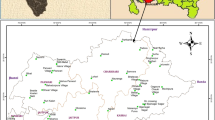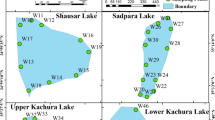Abstract
Groundwater is the most important drinking water resource for arid areas. Studying the quality of these resources makes it possible to maintain and guarantee the use of these waters rationally and efficiently. The quantity and quality of water available for different uses have not been identified in these areas to date. This work aims to determine the water quality in foggaras to identify their suitability for consumption and irrigation, using the geographic information system (GIS) and the water quality index (WQI). The results show that these waters are characterized by a pH between 5.73 and 8.89, a conductivity that varies between 830 and 1200 µs/cm, and high mineralization between 580 and 50,000 mg/l with an average value of 1818.89 mg/l. In addition, 80% of the points studied present a TDS (total dissolved salts) that exceeds the World Health Organization (WHO) standards. This study also highlights nitrate contamination in some wells, where values of 320 mg/l are well above the 50 mg/l standard. The calculation of the WQI shows that about 72% of the waters are between “excellent quality” and “good quality”; the waters exploited by the foggaras are therefore well suited for human consumption.



















Similar content being viewed by others
References
Acharya S, Sharma SK, Khandegar V (2018) Assessment of groundwater quality by water quality indices for irrigation and drinking in South West Delhi, India. Data Brief 18:2019–28. https://doi.org/10.1016/j.dib.2018.04.120
ANRH (2018) Bilan des inventaires des foggaras. Agence Nationale des ressources Hydrauliques, Raport Interne, Adrar, Algerie
Ansari T (2014) The preservation of foggaras in Algeria’s Adrar Province. 26th Euro-Mediterranean Regional Conference and Workshops. Innovate to improve Irrigation performances. International Commission on Irrigation and Drainage, Montpellier, p 108
Ansari T, Nasri B (2019) The added value of Geographic Information System (GIS) in monitoring and management of Foggaras. Int J Water Resour Arid Environ 8(2):138–154
Benhamza M (2013) Aperçu hydrogéologique et hydrochimique sur le système de captage traditionnel des eaux souterraines «foggara» dans la région d’’Adrar. These de doctorat, Université Badji Mokhtar de Annaba, Algérie
Boualem R, Achour B, Rabah K (2014) The foggara: a traditional system of irrigation in arid regions. Geosci Eng LX:32–39
Boumendjel K (2002) Nouvelles espèces de chitinozoaires du Silurien Supérieur et du Dévonien Inférieur du bassin de Timimoun (Sahara central, Algérie). Review of Palaeobotany and Palynology 118(1–4):29–46. https://doi.org/10.1016/S0034-6667(01)00106-3
Boutadara Y, Remini B, Benmamar S (2018) The foggaras of Bouda (Algeria): from drought to flood. Appl Water Sci 8:1–11. https://doi.org/10.1007/s13201-018-0822-7
Chehma A (2011) Le sahara en Algérie, situation et défis. In: L’effet du Changement Climatique sur l’élevage et la gestion durable des parcours dans les zones arides et semi-arides du Maghreb. Université Kasdi Merbah - Ouargla- Algérie, du 21 au 24 Novembre 2011, pp 14–21
Grandguillaume G (1973) Régime économique et structure du pouvoir : le système des foggaras du Touat. Rev Mondes Musulmans Méditerranée 13:437–457. https://doi.org/10.3406/remmm.1973.1222
Hadidi A, Saba D, Benmedjahed M, Blal M (2022) An overview on the development of the irrigation system in the province of Adrar (Algeria). Arab J Geosci 15:854. https://doi.org/10.1007/s12517-022-10103-8
Honarbakhsh A, Azma A, Nikseresht F et al (2019) Hydro-chemical assessment and GIS-mapping of groundwater quality parameters in semi-arid regions. J Water Supply Res Technol-Aqua 68:509–522
Kouadra R, Demdoum A (2020) Hydrogeochemical characteristics of groundwater and quality assessment for the purposes of drinking and irrigation in Bougaa area, Northeastern Algeria. Acta Geochim 39:642–654
Kumar SK, Bharani R, Magesh NS et al (2014) Hydrogeochemistry and groundwater quality appraisal of part of south Chennai coastal aquifers, Tamil Nadu, India using WQI and fuzzy logic method. Appl Water Sci 4:341–350
Laaboudi A, Nasri B, Ansari T, Benhamza M (2021) L’énergie renouvelable une alternative pour la préservation des foggaras. Algerian J Environ Sci Technol 7:1787–1796
Logeshkumaran A, Magesh NS, Godson PS, Chandrasekar N (2015) Hydro-geochemistry and application of water quality index (WQI) for groundwater quality assessment, Anna Nagar, part of Chennai City, Tamil Nadu, India. Appl Water Sci 5:335–343
Magesh NS, Krishnakumar S, Chandrasekar N, Soundranayagam JP (2013) Groundwater quality assessment using WQI and GIS techniques, Dindigul district, Tamil Nadu, India. Arab J Geosci 6:4179–4189. https://doi.org/10.1007/s12517-012-0673-8
Mohamed B, Remini B (2017) Water wells’ exploitation and its impact on the drying up of foggaras. Appl Water Sci 7:349–359. https://doi.org/10.1007/s13201-014-0250-2
(MRE) Ministre des Ressources en Eau MRE (2014) Décret exécutif N°A14-96 du 2 Joumada El Oula 1435 correspondant au 4 mars 2014 modifiant et complétant le décret exécutif N°A 11-125 du 17. Rabie Ethani 1432 correspondant au 22 mars. 2011 relatif à la qualité de l’eau de consommation humaine
Nasri B, Benatiallah A, Kalloum S, Benhamza M (2018) Caractérisation physico-chimique des eaux souterraines de la région de Kenadsa et Galbelaousa (Sud-ouest de l’Algérie). Algerian J Env Sc Technol 4:82–93
Nasri B, Benatiallah A, Kalloum S, Benatiallah D (2019) Improvement of glass solar still performance using locally available materials in the southern region of Algeria. Groundw Sustain Dev 9:100213. https://doi.org/10.1016/j.gsd.2019.100213
Nasri B (2019) Étude Expérimentale et Optimisation d’un Système de Dessalement Solaire En Milieu Saharien. Thesis, Université Ahmed Draïa-Adrar
Remini B, Achour B (2008) Vers la disparition de l’une des plus grandes foggaras d’Algérie: la foggara d’El Meghier. Sci Chang PlanétairesSécheresse 19:217–221
Remini B, Achour B (2016) The water supply of oasis by albian foggara: an irrigation system in degradation. LARHYSS J (26):167–181
Remini B, Achour B (2017) La foggara de Tademaït: sans énergie de l’eau du sous-sol à la surface du sol. Larhyss J 32:301–325
Remini B, Achour B, Belkhir ChO, Dahmane BA (2012) The Mzab foggara: an original technique for collecting the water rising. J Water Land Dev 16:49–53. https://doi.org/10.2478/v10025-012-0024-x
Rodier J, Legube B, Merlet N, Brunet R (2009) L’analyse de l’eau - 9eme éd.: Eaux naturelles, eaux résiduaires, eau de mer, Dunod, France, p 1579
Sahara The, Sahel Observatory(OSS) (2008) The north-western Sahara aquifer system (Algeria, Tunisia, Libya). The Sahara and Sahel Observatory (OSS), Tunisia
The Sahara and Sahel Observatory (OSS) (2005) Western basin; hydrogeology and conceptual model. The Sahara and Sahel Observatory (OSS), Tunisia
Vernoux JF, Lions J, Petelet-Giraud E et al (2010) Contribution à la caractérisation des relations entre eau souterraine, eau de surface et écosystèmes terrestres associés en lien avec la DCE. Rapport BRGM/RP-7044-Fr, Orléans, France, p 207
Voudouris K, Voutsa D (2012) Water quality: monitoring and assessment. IntechOpen, Rjeka, Croatia, p 618
World Health Organisation (WHO) (2011) Guidelines for drinking-water quality, 4th edn. World Health Organization, Geneva
Acknowledgements
The authors would like to thank the DGRSDT first and the anonymous reviewers for their review. Their gratitude extends to the Arabian Journal of Geosciences editors.
Author information
Authors and Affiliations
Corresponding author
Ethics declarations
Conflict of interest
The authors declare no competing interests.
Additional information
Responsible Editor: Broder J. Merkel
Highlights
• This topic treats the degradation of foggara water quality in arid zones and remote areas as the Adrar region.
• The foggaras maintained the life of the population in these areas for many centuries.
• This system makes use of water without energy.
Rights and permissions
Springer Nature or its licensor (e.g. a society or other partner) holds exclusive rights to this article under a publishing agreement with the author(s) or other rightsholder(s); author self-archiving of the accepted manuscript version of this article is solely governed by the terms of such publishing agreement and applicable law.
About this article
Cite this article
Nasri, B., Kalloum, S., Benhamza, M. et al. Water quality study of the foggaras in the Adrar region (southwest Algeria) using WQI and GIS. Arab J Geosci 15, 1758 (2022). https://doi.org/10.1007/s12517-022-11050-0
Received:
Accepted:
Published:
DOI: https://doi.org/10.1007/s12517-022-11050-0




